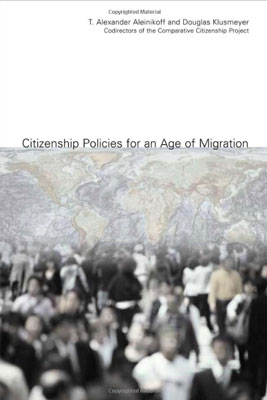Source: Washington
 Liberal democracies, facing high levels of immigration, are rethinking citizenship policies. How should liberal states fashion membership policies for newcomers? A panel of international experts convened by the Carnegie Endowment for International Peace offers detailed and important recommendations on issues of acquisition of citizenship, dual nationality, and the political, social, and economic rights of immigrants.
Liberal democracies, facing high levels of immigration, are rethinking citizenship policies. How should liberal states fashion membership policies for newcomers? A panel of international experts convened by the Carnegie Endowment for International Peace offers detailed and important recommendations on issues of acquisition of citizenship, dual nationality, and the political, social, and economic rights of immigrants.
Citizenship Policies for an Age of Migration is the third volume in the citizenship series. Previous volumes include Citizenship Today: Global Perspectives and Practices (Carnegie Endowment, 2001) and From Migrants to Citizens: Membership in a Changing World (Carnegie Endowment, 2000).
About the Project Directors
T. Alexander Aleinikoff is senior policy analyst at the Migration Policy Institute and professor of law at the Georgetown University Law Center.
Douglas Klusmeyer is visiting scholar with the Migration Policy Institute and assistant professor in the Department of Justice, Law and Society at American University.
Advance Praise
"This important report on citizenship policies embodies state-of-the-art research by a multinational panel of leading experts from several disciplines. The fruit of their collaboration is a set of balanced and incisive recommendations that no major democracy can afford to ignore."
—Gerald Neuman, Columbia University
"This final volume on citizenship policies contains comprehensive recommendations. They will not only shape the future debate; but they will also help to promote necessary changes for the benefit of receiving societies and their immigrant populations."
—Rainer Münz, Humboldt-University
